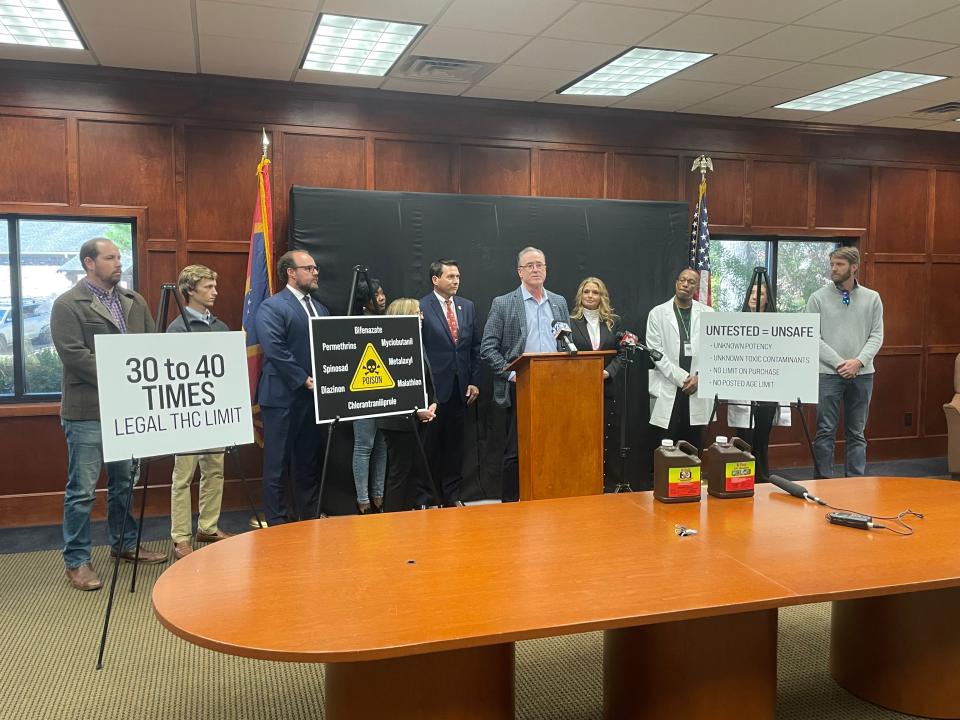Jackson-based cannabis lab conducted testing of legal weed products. See the results
A Jackson-based cannabis testing lab announced Tuesday that potentially deadly toxins have been detected in over-the-counter cannabis products widely available throughout Mississippi.
Employees and scientists at Steep Hill Mississippi, a cannabis testing lab, said that some cannabis products contain much more tetrahydrocannabinol, commonly referred to as THC, the psychoactive component in marijuana, that federal law allows.
Specifically, they tested products containing Delta 9 THC, the most common type of THC found in cannabis plants, according to the health and wellness publication Healthline.

The scientists discovered some products had 30 to 40 times the amount of THC allowed; some had 12-14% Delta-9 THC, Osbon said. They also found some products contained pesticides such as bifenazate, myclobutanil, metalaxyl, malathion, chlorantraniliprole, diazinon, spinosad and permethrins.
Cliff Osbon, president and co-founder of Steep Hill Mississippi, said those products would have failed the Mississippi Department of Health's standards of medical marijuana by containing pesticides.
Degrees in Weed?: Ole Miss to offer medical marijuana master's degree. Here's what to know
Some people might ask how people can purchase cannabis products without having a medical marijuana card given recreational use is not legal in Mississippi. In 2018, the U.S. Congress passed the "Farm Bill," which legalized industrial hemp. Hemp contains 0.3% or less of THC, which isn't enough to create the "high" feeling associated with marijuana.
Since the passing of the "Farm Bill," cannabis companies throughout the nation have begun selling products such as weed-cigarettes, vapes and edible gummies that supposedly have hemp, or 0.3% or less THC. Residents do not need a medical marijuana card to purchase those products and they are commonly found in gas stations, convenience stores and smoke shops.
"On Nov. 27, I personally went around Rankin County (and) went to a number of gas stations and convenience stores and purchased products labeled they contained Delta 9 THC, the primary ingredient in marijuana," Osbon said.
"Reportedly these come from the hemp plant, not the marijuana plant, and remember as such they can have 0.3% THC," Osbon said. "Our science team and their technicians tested these for potency, and we were staggered by the results we found."
Osbon said the products that were tested include weed-cigarettes, vapes and edible gummies. He would not give specific brand names of products or store locations where they can be found.
"We in no way want to encourage anyone who sees this information to go out and access those products because of their questionable safety," he said. "While merchants may have been told that these products are safe, legal and tested and may have been told they are exempt from the Farm Bill, our testing results call that into question."
Kelly Williams, the founder and CEO of medical marijuana dispensary Kelly's Green located in Rankin County, spoke at the press conference, saying she was "shocked and concerned" when showed Steep Hill's test results.
Marijuana and money: Economic outlook: Medical marijuana is likely to bring in millions in the coming years
"These findings undermine patient access to safe and effective medicine, which in-turn undermines the entire medical marijuana program," Williams said. "There are many Mississippians that have devoted their lives to supporting this program … it undermines their efforts as well."
She was also concerned by the fact that those products have no age restriction.
"Many of these products, if not all of them, are accessible to anyone of any age. As the parent of three children —two are grown — but I still have a teenage son at home, that is very concerning to me," Williams said.
State representative calls for action
Lee Yancey was a co-author of the Mississippi Medical Cannabis Act, which was signed into law last year. In response to Steep Hill Mississippi's findings, Yancey said he plans to file a new bill next month that effects those hemp-based products that were tested, though he was sparse on specifics of the bill.
Medical Marijuana in MS: Medical marijuana is now legal in Mississippi. Here's what we know about the new law
Yancey is a member of the Mississippi House of Representatives and represents parts of Rankin County in District 74.
"It (the bill) could do one of many things. It could require them (the products) to be tested in the state of Mississipp," Yancey said. "It could require an age limit, we could do an all out ban on anything that's synthetic. These products are causing problems in all 82 counties."
Yancey said he has heard from school officials throughout the state who have told him that middle schoolers and high-schoolers buy those products and "they're high all day."
"These findings confirm that there is illegal activity going on, Yancey said. "There are people selling drugs to minors in gas stations all across our state, and we're going to do something about it."
This article originally appeared on Mississippi Clarion Ledger: Illegal amounts of THC found in legal cannabis products across MS

